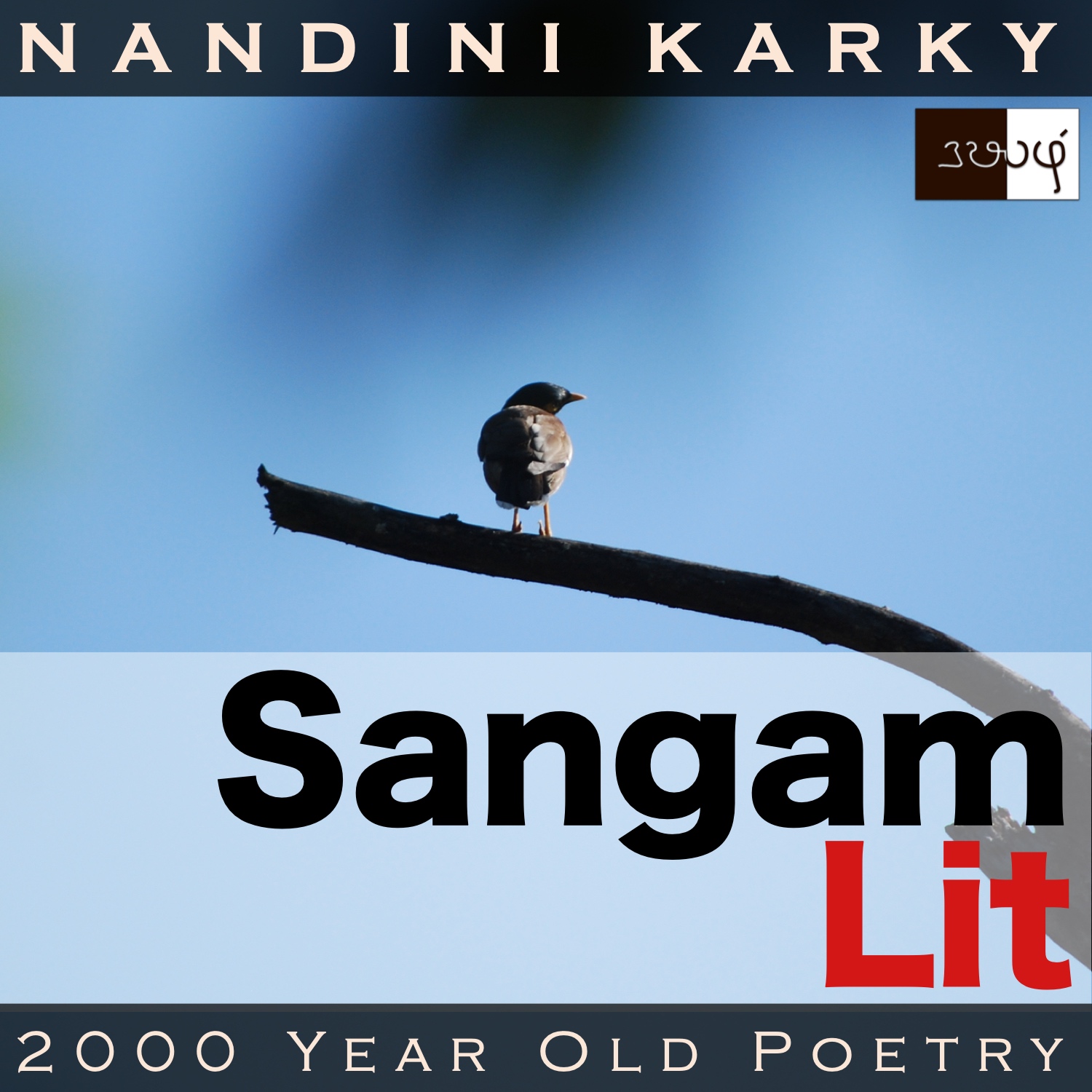Podcast: Play in new window | Download
Subscribe: Apple Podcasts | Spotify | Amazon Music | Android | iHeartRadio | Email | TuneIn | RSS | More

In this episode, we observe the inner life depicted in Tamil Sangam Literary work, Natrinai 20, written by Orambokiyar, a poet who specialises in the ‘Marutham’ landscape or the farmland regions of ancient Tamil land. The focus of Marutham poems is on the love-quarrel between a man and his lady. This particular poem is expressed in the words of a lady to her man, disagreeing with his remark.
ஐய! குறுமகட் கண்டிகும்: வைகி,
மகிழ்நன் மார்பில் துஞ்சி, அவிழ் இணர்த்
தேம் பாய் மராஅம் கமழும் கூந்தல்
துளங்குஇயல் அசைவர, கலிங்கம் துயல்வர,
செறிதொடி தெளிர்ப்ப வீசி, மறுகில்,
பூப் போல் உண்கண் பெயர்ப்ப நோக்கி,
சென்றனள்-வாழிய, மடந்தை!-நுண் பல்
சுணங்கு அணிவுற்ற விளங்கு பூணள்;
மார்புறு முயக்கிடை ஞெமிர்ந்த சோர் குழை,
பழம் பிணி வைகிய தோள் இணைக்
குழைந்த கோதை, கொடி முயங்கலளே.
At first glimpse, I understood that this poem was about a young woman for we find on one hand, words directly meaning ‘a girl’ as in ‘குறுமகள்’, ‘மடந்தை’ and ‘கோதை’ as well as those unique Tamil word formations which combine a pronoun and a verb as one word such as ‘சென்றனள்’ meaning ‘she went’ and ‘பூணள்’ meaning ‘she wore’. This is rather interesting because with such a coinage, the distance between a person and their action is reduced, as if underscoring the truth that you are what you do.
In our explorations in Natrinai, this is the first time we are encountering the landscape of ‘Marutham’ or the cultivatable regions. The poem depicts a scene where a man, when questioned about a mistress he is seeing, he replies saying that he doesn’t know of any such person. To his statement feigning ignorance, his lady replies saying, “O lord! I have seen that young girl. She, who had slept on your wide chest came here with her untied, following tresses, fragrant with the scent of honey-bees swarming Kadamba flowers, and her clothes swaying apart. She walked with the sound of her armlets echoing, with those kohl-adorned eyes, in the shade of blue lilies, looking pointedly here, as she walked by. With many pale spots on her skin, adorned with shiny jewels, she appeared. I could see the crushed petals on her garland, ruined by your embrace. She walked with the gait of one who is pining for your love. Long live that maiden!”
Before we move on to the relationship depicted, I would like you to turn your attention to the ‘மராஅம்’ flowers mentioned. These are the flowers of the Kadamba tree, called commonly in English as the ‘burflower tree’, having a reddish-orange bulbous shape. I was intrigued to read that the current city of Madurai has a deep connection with this Kadamba tree. The region now referred to as the city of Madurai, was once a forest filled with these kadamba trees. A religious connection is that this ‘kadamba’ tree is intimately connected with the world famous Meenakshi Amman Temple, located in Madurai and serves as the temple’s monumental tree. Surely, a thing to look forward to, in my next visit to the ‘temple city’ is to bow before this special tree! The name of ‘Madurai’ itself is said to have come from the word ‘Marudha Thurai’ or the ‘province of farmland’. Amazed that this ancient poem is teaching me so much about a contemporary Tamil city!
Travelling from the land inwards into the mind of the protagonist, we find that the lady in a distressful situation. The man has broken the lady’s heart with his act of betrayal and falsehood and yet, the lady speaks such positive words. How could it be possible to see the good when you are in pain? The lady describes the scene of her seeing the other woman, not casting aspersions on her, but seeing her as she is. To me, this illustrates what psychologists and philosophers mean when they say, ‘be with your pain!’. By this, they don’t mean that you should ignore your pain or keep living in discomfort but rather to be one with whatever is causing you that pain and moving to the core of the distress. When things bother us, we immediately want to move away from it, distract ourselves, do anything but face it. Here, in the words of this lady, we see a way to be with pain, to understand and to emerge, a better and a wiser person!




Share your thoughts...